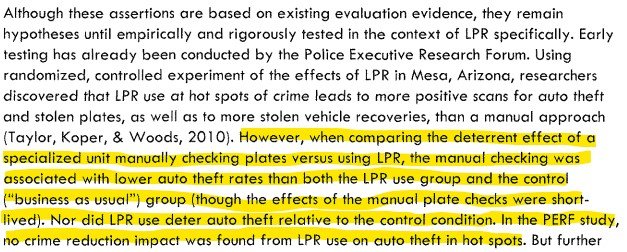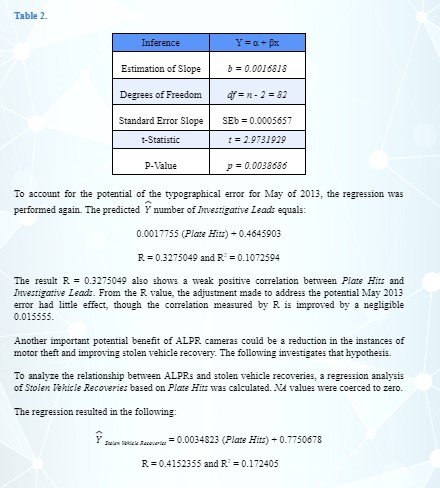Random chance is as much a factor in the reported “successes” as use of ALPR
Jonathan Hofer is a Research and Marketing Associate at the Independent Institute. A Political Science graduate of the University of California, Berkeley, his research interests include privacy law, student privacy, local level surveillance, and the impact of emerging technologies on civil liberties.
Disclosure: Jonathan is the youngest sibling of Secure Justice ED Brian Hofer. This paper has been through the PhD review process to ensure the findings withstood scrutiny.
In a groundbreaking efficacy report on the use of automated license plate readers (“ALPR”), Jonathan Hofer of Oakland’s The Independent Institute has demonstrated through statistical analysis that Piedmont, California, a “super user” of ALPR, might as well flip a coin to get the same results its residents believe they are getting from use of the technology.
His key findings:
After analyzing sixteen years of stolen vehicle numbers from Piedmont, there is no statistical evidence that ALPRs have deterred motor theft
There is no statistical evidence that ALPRs are effective at giving law enforcement investigative leads
There is not even a moderate correlation between ALPRs and stolen vehicle recoveries
In 2013, the city of Piedmont spent $576,378.80 on 39 ALPR cameras that don't show signs of being effective crime fighting tools
Cities across America pour money into high tech crime fighting tools that don't work as advertised, while fleecing the taxpayers
What this paper does not claim:
That no ALPR has ever achieved a legitimate public safety “success” - investigative lead, arrest, recovery of stolen vehicle
That no ALPR can ever provide sufficient efficacy
That Piedmont PD is accurately describing and tracking its use of ALPR technology
That the legitimate concerns of the individual success stories are meaningless
However, the author can only rely on the data presented by Piedmont PD, and as that same data has been used to justify the taxpayer expense and privacy invasiveness of the technology and data collection, it is ripe for scrutiny and analysis. According to this report, the use of ALPR as a tool does not provide sufficient efficacy to justify the mass surveillance practice that comes with use of ALPR.
A 2010 report on ALPR by the “Center for Evidence-Based Crime Policy” out of George Mason University is generally pro-ALPR use - yet their findings comport with Mr. Hofer’s analysis - ALPR isn’t an effective tool for crime fighting, including stolen vehicle recovery.
(screen shot below is from pg. 32940 in the George Mason report here)
It would be wise of elected officials, generally the resource allocators in their respective jurisdictions, to review these findings to ensure that they are not selling their constituents false hope. It is not good government to make mass policy guidelines based on a few outlier success stories. When the police themselves acknowledge in writing and before their governing bodies that 99.97% of all scans will never be used for a public safety purpose, it raises the very legitimate question of why we’re using this technology in the first place. Although many folks would waive some privacy protections for greater public safety, ALPR appear to provide a statistical goose egg, a “0” when fighting violent crime and even when attempting to recover stolen vehicles. To their credit, law enforcement has generally admitted that ALPR have no deterrent effect on any public safety metric. The Police Executive Research Forum report on Mesa, Arizona similarly agreed with the George Mason Report and Mr. Hofer’s analysis - ALPR are not effective crime fighting tools.
(screenshot from Hofer paper)
(screenshot from Hofer paper)
All across the United States, laypeople are demanding the use of ALPR because they believe what they are told by police - that this is life saving technology, and that a computer can’t be racist so ALPR will cure or mitigate concerns regarding racial profiling. As an organization that “warms up” police when approaching a new jurisdiction regarding surveillance technology vetting frameworks, we cannot count the number of times a police Chief has told us that ALPR is a life saving technology that must be used. When asked for the data to support such a conclusion, the conversations quickly end.
A typical ALPR efficacy report from the Piedmont, CA police department. Piedmont PD typically captures on average the driving patterns and historical locations of 2 million+ drivers annually, further confirming how little ALPR impacts crime fighting and stolen vehicle recovery. 26 investigative leads out of 2MM plate scans equals a 0.0013% “success”, but does not itself confirm that any arrest or stolen vehicle actually occurred, only that a potential lead was generated.
(screenshot from Hofer paper)
(screenshot from Hofer paper)
All across the country, communities are simultaneously demanding that violent crime be addressed, and that law enforcement resources be better allocated - some examples have included moving funds towards more mental health crisis intervenors, and civilianizing traffic enforcement. The analysis that this paper provides is a valuable tool to ensure that we don’t continue the mistakes of the past, and that we don’t waste scarce taxpayer dollars on technology that has a clear, negative civil liberties impact, while not providing a commensurate return with increased public safety in exchange for a loss of privacy and civil liberties interests.
We do need to address violent crime in our communities, but spending money on “silver bullets” rarely works, and the false hope of Silicon Valley that tech will solve problems that have existed for hundreds, if not thousands of years, is starting to fall apart. We understand why law enforcement is so opposed to a cost-benefit analysis - many of their technological “solutions” won’t withstand scrutiny.
You can find the full length paper here.
[Ed note: Secure Justice’s Brian Hofer has repeatedly requested to meet with Piedmont PD to discuss their ALPR reporting methodology. He has yet to receive a response.]
If you would like to support the work of Secure Justice, please click the button below.








